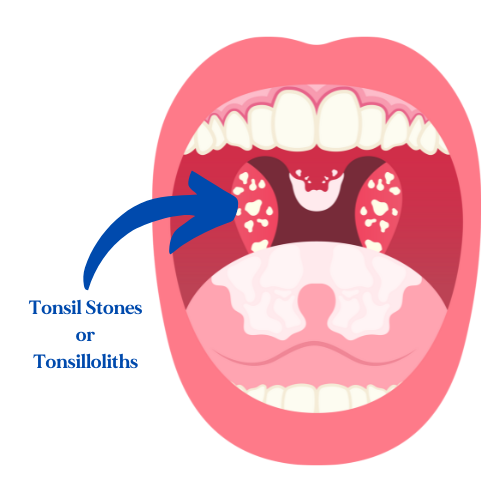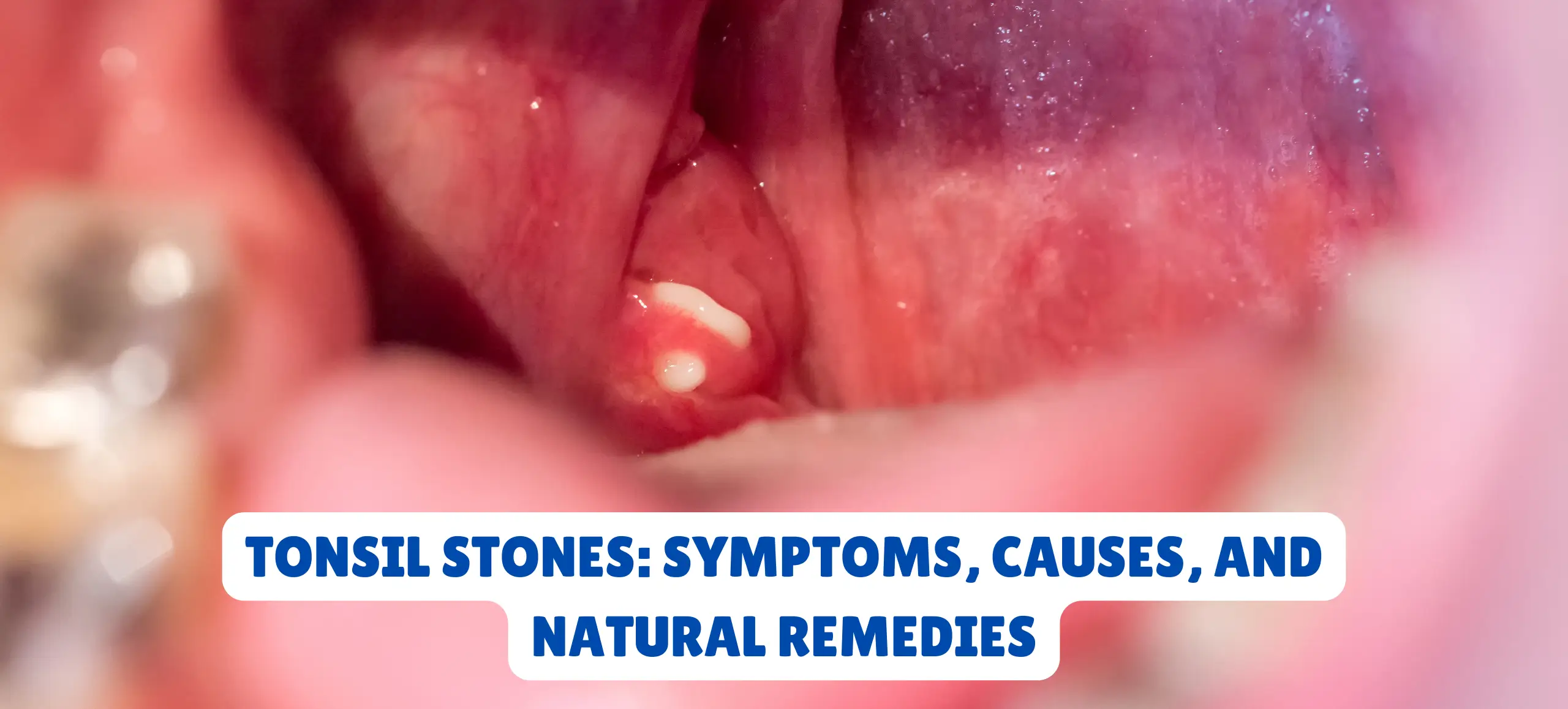Introduction
Tonsilloliths aka tonsil stones are nothing but small and solid stones that form on your tonsil. These stones can cause discomfort and lead to various symptoms. While they are generally not harmful, they can be annoying and sometimes painful. Understanding the symptoms, causes, and natural remedies for tonsil stones can help you manage this condition effectively.
What Are Tonsil Stones or Tonsilloliths?

Tonsil stones form when debris, such as food particles, dead cells, and mucus, get trapped in the crevices of the tonsils. The tonsils are small, glandular structures located at the back of the throat. They play a role in the immune system by trapping bacteria and viruses. When the trapped debris calcifies, it forms hard stones. These stones can vary both in size and colors. The size ranges from 3-5mm and for colors it can be white or yellowish.
Symptoms of Tonsil Stones
These Tonsil stones has many of symptoms, such as:
- Bad breath (halitosis)
- Sore throat
- Difficulty swallowing
- Ear pain
- Swollen tonsils
- White or yellow debris on the tonsils
- Persistent cough
- Unpleasant taste in the mouth
Some people may have tonsil stones without experiencing any symptoms. In such cases, the stones are often discovered during a routine medical examination.
Causes of Tonsil Stones
There are many factors that can help form these pesky little stones. Which includes:
- Poor oral hygiene: Not brushing and flossing regularly can lead to the accumulation of food particles and bacteria in the mouth, which can get trapped in the tonsils.
- Chronic tonsillitis: Frequent inflammation of the tonsils can increase the likelihood of debris getting trapped and forming stones.
- Large tonsils: People with larger tonsils have more crevices where debris can get trapped.
- Sinus infections: Postnasal drip from sinus infections can lead to the accumulation of mucus on the tonsils.
- Diet: A diet high in dairy products can increase the likelihood of developing tonsil stones, as dairy can contribute to mucus production.
Diagnosis of Tonsil Stones
Physical examination is probably one of the best methods to diagnose tonsil stones. Professionals use lighted instruments to look at the tonsils and check for any stones. In some cases, imaging tests such as X-rays or CT scans may be used to detect stones that are not visible during a physical examination.
5 Natural Remedies For Tonsil Stones

1. Apple Cider Vinegar Gargle
Apple cider vinegar has antibacterial properties that can help dissolve tonsil stones and prevent them from forming. To use this remedy, mix one tablespoon of apple cider vinegar with a glass of warm water. Then Gargle with it for at least a few minutes, before spitting it out. Repeat this process two to three times a day until the stones dissolve.
2. Coughing
Coughing can help dislodge tonsil stones from the crevices of the tonsils. If you feel a stone in your throat, try coughing forcefully to bring it up. Be careful not to hurt your throat in the process.
3. Salt Water Gargle
A salt water gargle can help reduce inflammation and kill bacteria in the throat. To make a salt water gargle, dissolve one teaspoon of salt in a glass of warm water. Gargle with the solution for 30 seconds, then spit it out. Repeat this process several times a day to help dislodge and dissolve tonsil stones.
4. Cotton Swabs
Cotton swabs can be used to gently remove tonsil stones from the tonsils. Moisten the swab with water and use it to gently push the stone out of the crevice. Be very gentle to avoid injuring the tonsils. If the stone is deep or difficult to reach, it is best to seek professional help.
5. Include Probiotics in Diet
Probiotics are beneficial bacteria that can help maintain a healthy balance of bacteria in the mouth and throat. Including probiotics in your diet can help prevent the formation of tonsil stones. You can take probiotic supplements or eat probiotic-rich foods such as yogurt, kefir, and sauerkraut.
6. Antibacterial Mouthwash
Using an antibacterial mouthwash can help kill bacteria in the mouth and prevent the formation of tonsil stones. Look for a mouthwash that contains chlorhexidine or another antibacterial agent. Rinse your mouth with the mouthwash once or twice a day for best results.
7. Oral Irrigation
Oral irrigation involves using a device to flush out debris from the tonsils. A water flosser can be used to direct a stream of water at the tonsils and dislodge any trapped debris. Be sure to use the device on a low setting to avoid injuring the tonsils.
When to Seek Professional Help
While natural remedies can be effective in managing tonsil stones, there are times when it is necessary to seek professional help. If you experience any of the following symptoms, it is best to consult a healthcare provider:
- Severe pain in the throat or ears
- Difficulty swallowing or breathing
- Persistent bad breath that does not improve with oral hygiene
- Large tonsil stones that cannot be removed with home remedies
- Recurring tonsil stones despite trying natural remedies
A healthcare provider can offer various treatments for tonsil stones, including manual removal, laser treatment, or surgery to remove the tonsils (tonsillectomy).
Conclusion
Tonsil stones can be a bothersome condition, but with the right approach, they can be managed effectively. Understanding the symptoms and causes of tonsil stones can help you take preventive measures. Natural remedies such as apple cider vinegar gargles, salt water gargles, and probiotics can help dissolve and prevent tonsil stones. However, if the condition persists or causes significant discomfort, it is important to seek professional help. Maintaining good oral hygiene and a healthy diet can go a long way in preventing the formation of tonsil stones and keeping your throat healthy.
Your Questions and Our Answers on Natural Remedies For Tonsil Stones
How to Prevent Tonsil Stones
Preventing tonsil stones involves maintaining good oral hygiene and adopting certain lifestyle habits. Read our tips to help you prevent tonsil stones:
- Brush and Floss Regularly: Brush your teeth at least twice a day and floss daily to remove food particles and bacteria from your mouth.
- Use Mouthwash: Use an antibacterial mouthwash to kill bacteria and keep your mouth clean.
- Stay Hydrated: Drink plenty of water throughout the day to keep your mouth moist and prevent the buildup of debris.
- Avoid Smoking: Smoking can dry out your mouth and increase the likelihood of developing tonsil stones.
- Limit Dairy Intake: Dairy products can increase mucus production, which can contribute to the formation of tonsil stones. Try to limit your intake of dairy products.
- Gargle with Salt Water: Regularly gargling with salt water can help reduce bacteria and inflammation in your throat.
- Eat a Healthy Diet: A balanced diet with plenty of fruits, vegetables, and probiotics can help maintain a healthy balance of bacteria in your mouth and throat.
Are Tonsil Stones Normal?
Yes, tonsil stones are relatively common and normal, especially in adults. Many people may have tonsil stones at some point in their lives without even realizing it, as they can be small and asymptomatic. While they can cause discomfort and bad breath, they are usually not a sign of a serious medical condition. However, if you have large or recurrent tonsil stones, it is a good idea to consult a healthcare provider to rule out any underlying issues.
Why Do Tonsil Stones Stink?
Tonsil stones can have a foul odor due to the presence of bacteria and decaying organic matter trapped in the tonsils. Here’s why they stink:
- Bacteria: Tonsil stones provide a breeding ground for bacteria, which produce sulfur compounds as they break down the trapped debris. These sulfur compounds have a strong, unpleasant odor.
- Decaying Matter: Tonsil stones are made up of trapped food particles, dead cells, and mucus. As these materials decay, they release foul-smelling compounds.
- Anaerobic Conditions: The crevices of the tonsils provide an anaerobic (oxygen-free) environment, which is ideal for certain types of bacteria that produce bad odors.
Why Do I Keep Getting Tonsil Stones?
If you keep getting tonsil stones, it could be due to several factors:
- Chronic Tonsillitis: Frequent inflammation of the tonsils can increase the likelihood of debris getting trapped and forming stones.
- Large Tonsils: People with larger tonsils have more crevices where debris can get trapped.
- Poor Oral Hygiene: Not brushing and flossing regularly can lead to the accumulation of food particles and bacteria in the mouth, which can get trapped in the tonsils.
- Sinus Infections: Postnasal drip from sinus infections can lead to the accumulation of mucus on the tonsils.
- Diet: A diet high in dairy products can increase the likelihood of developing tonsil stones, as dairy can contribute to mucus production.
- Dehydration: Not drinking enough water can lead to a dry mouth, which can increase the risk of tonsil stones.

